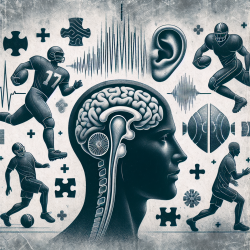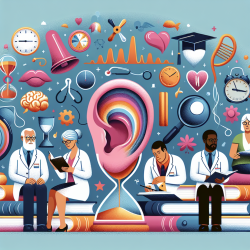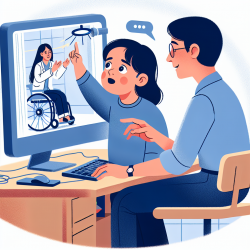Introduction
In the realm of sports-related injuries, concussions have garnered significant attention due to their potential long-term impact on cognitive functions. A recent study titled "Auditory comprehension performance of college students with and without sport concussion on Computerized-Revised Token Test Subtest VIII" sheds light on the auditory comprehension deficits that may arise following a concussion. This blog aims to explore the implications of this research for practitioners in speech-language pathology and encourage further exploration in this critical area.
Key Findings from the Research
The study conducted by Salvatore et al. (2017) investigated the auditory comprehension performance of college athletes who had experienced a concussion compared to healthy controls. Using the Computerized-Revised Token Test (C-RTT) Subtest VIII, the researchers found that post-concussed (PC) subjects had significantly lower efficiency scores in auditory comprehension compared to healthy controls (HC). Additionally, the study highlighted the following key points:
- PC subjects exhibited lower scores in verbal memory, visual memory, and reaction time as measured by the Immediate Postconcussion Assessment and Cognitive Test (ImPACT).
- The relationship between auditory comprehension and other cognitive functions was inconsistent, indicating that the C-RTT and ImPACT assess different functional systems.
- The study underscored the importance of including auditory comprehension assessments in concussion management protocols.
Implications for Practitioners
For speech-language pathologists and other practitioners working with concussed individuals, these findings emphasize the need for a comprehensive assessment approach that includes both auditory and visual cognitive tests. Here are some practical steps practitioners can take based on the study's outcomes:
- Incorporate Auditory Comprehension Tests: Utilize tools like the C-RTT to assess auditory comprehension, especially in athletes who have sustained a concussion. This can provide valuable insights into their cognitive-communication abilities.
- Develop Tailored Intervention Plans: Based on assessment results, create individualized intervention plans that address specific deficits in auditory comprehension and other cognitive areas.
- Monitor Progress Over Time: Regularly assess auditory comprehension to track recovery and adjust intervention strategies as needed.
Encouraging Further Research
While this study provides critical insights, it also highlights the need for further research to explore the nuances of auditory comprehension deficits in concussed individuals. Future studies could focus on:
- Longitudinal assessments to understand the recovery trajectory of auditory comprehension post-concussion.
- Exploring the impact of multiple concussions on auditory comprehension and other cognitive functions.
- Developing and validating new assessment tools that integrate auditory and visual cognitive tests for a holistic evaluation.
Conclusion
The research by Salvatore et al. underscores the critical role of auditory comprehension in the cognitive assessment of concussed athletes. By integrating these findings into clinical practice, practitioners can enhance their assessment and intervention strategies, ultimately leading to better outcomes for individuals recovering from sports-related concussions.
To read the original research paper, please follow this link: Auditory comprehension performance of college students with and without sport concussion on Computerized-Revised Token Test Subtest VIII.










